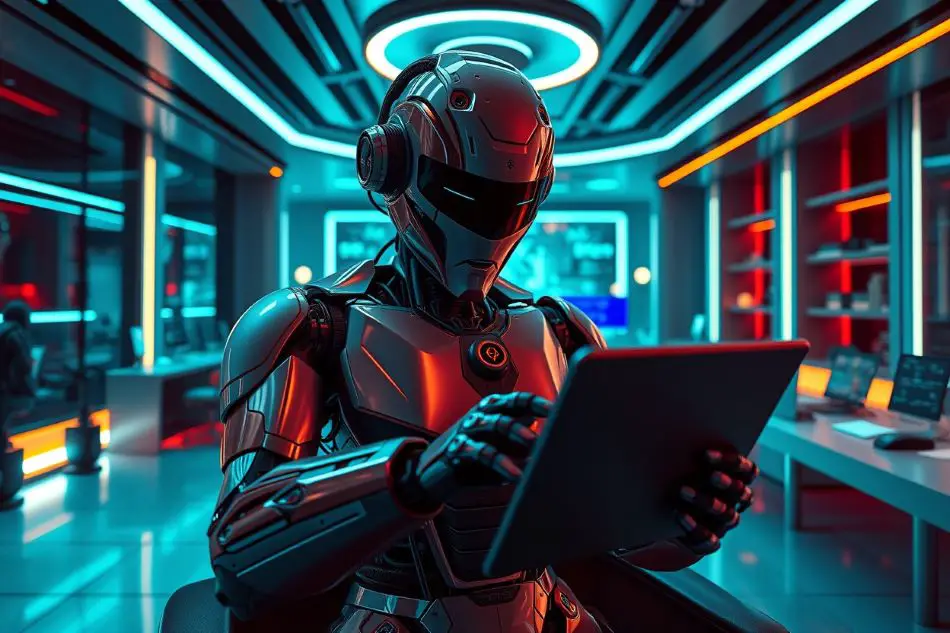AI website builders: Launch your stunning site in minutes, not hours

Are you ready to launch your online presence without getting bogged down by complex coding, high costs, or lengthy development cycles? Imagine describing your ideal website in simple terms and watching it come to life within minutes—no technical skills required when you are building a website with AI.
Today, a powerful AI website builder or a coding assistant can make this possible by automating design, coding, and optimization, dramatically cutting down the time and expense typically involved in website creation.
Key Takeaways
- Rapid Deployment: AI website builders can reduce development time by up to 90%, allowing you to go from concept to live website in around 7 minutes.
- Cost Efficiency: By lowering the need for extensive coding and specialized labor, these tools make professional websites affordable.
- User-Friendly Design: With no coding required, anyone can create and manage a website using intuitive, prompt-based systems.
- Diverse Approaches: A range of tools—from prompt-to-publish builders to advanced AI coding assistants—caters to different needs
- Future-Proofing: The integration of AI agents for coding and continuous website optimization is the shift toward lean, highly efficient operations.
AI’s Role in Modern Web Development
Market research indicates that certain segments of the AI website builder market are growing at compound annual rates of up to 32.9%. Global market projections show growth from around USD 8.5 billion in 2022 to nearly USD 25.6 billion by 2030.
This rapid expansion is driven by small businesses, digital agencies, and freelancers who value speed, affordability, and simplicity.
We will explore the major changes in web development, review the key AI tools for website development available today, and examine how these innovations are reshaping the roles of business owners, IT professionals, and outsourcing companies.
The evolution of web development

To appreciate the current AI disruption, it is useful to look back at how website development has evolved:
Hand-Coded Websites (1990s–2000s):
In the early days, websites were built entirely from scratch using HTML, CSS, and JavaScript. This process required deep technical skills and could take anywhere from six months to a year for even a basic site.
Content Management Systems (CMS) (2010s):
The introduction of CMS platforms like WordPress and Joomla marked a leap forward. These systems provided pre-designed templates and user-friendly interfaces, reducing development time to two to eight weeks. However, while CMS platforms simplified content management, deeper customization often still required coding.
No-Code Platforms (2015–2020):
No-code tools such as Squarespace and Wix took simplicity further by offering drag-and-drop interfaces. These platforms allowed users with no coding knowledge to build websites in as little as one to seven days. They opened website creation to a wider audience, though their flexibility for highly customized projects could be limited.
The AI Era (2022–Present):
Today, AI website builders have taken over the process. By leveraging natural language processing and machine learning, these tools allow you to describe your website’s purpose and features in plain language, and they generate a live, functional website within minutes. Early AI breakthroughs, such as GPT-3’s ability to translate text into code, laid the groundwork for this rapid development. Now, platforms can automatically optimize design, generate content, and adjust SEO in real time.
Building a website with AI – what’s available?
AI-driven website creation now comes in several forms, each suited to different user needs:
Prompt-to-Publish AI website builders:
Platforms like the Wix AI Website Builder allow you to simply state your vision—for example, “I need a website for my bakery with an online shop and a blog”. It will come live as a fully functional website almost instantly.
What sets Wix apart is its comprehensive suite of intelligent features. Its AI engine not only creates responsive layouts and customized designs based on your input but also provides real-time SEO guidance and dynamic design adjustments that continuously refine your site as user behavior evolves.
With built-in personalization tools, Wix ADI tailors content to match your brand’s identity and ensures that every element of the site meets high performance standards. These advanced capabilities, combined with its user-friendly interface has cemented Wix’s position as the leading prompt-to-website AI tool in the market.
Other worthy mentions in the AI website builder space are SquareSpace and Dora.run with a focus on 3D Imagery implemented in websites.
Design-to-Code platforms:
Tools such as Lovable.dev and Copycoder.ai help bridge the gap between visual design and functional code. You upload your design mockups (from tools like Figma or just a screenshot), and the platform translates them into responsive code or a comprehensive functional prompt to be used in AI Coding assistants.
This approach is particularly useful for creative agencies that want to maintain a unique visual identity without spending excessive time on manual coding.
Code-First AI Platforms:
For developers who prefer to work directly with code while still leveraging AI for efficiency, code-first platforms offer a practical solution. For instance, Bolt.xyz lets you articulate a desired functionality in plain language and then translates that description into code snippets that integrate seamlessly with various APIs and databases.
Similarly, Abacus AI Code LLM or Llama code specialize in converting natural language instructions into precise, production-ready code in different programming languages.
These tools are particularly effective for rapid prototyping and for building dynamic, data–driven websites. By automating the repetitive aspects of coding, they allow you to focus on refining the overall logic and architecture of your application, streamlining your workflow without sacrificing technical control.
AI coding assistants
In contrast, AI coding assistants are designed to integrate directly into your coding environment as interactive helpers. Tools like GitHub Copilot and Devin AI serve as virtual pair programmers, providing real-time code completions, suggestions, and debugging support as you write.
They help catch errors early and speed up development by working alongside you in the integrated development environment (IDE).
Emerging AI Agents for coding
The next evolution in coding automation involves AI agents that can autonomously plan, write, test, and debug code. Early systems such as Devin AI have demonstrated error–correction rates around 13.86% without human intervention, outperforming earlier models.
These agents hint at a future where developers work alongside AI to handle routine tasks, allowing them to focus on creative problem-solving and innovation.
AI for ongoing website optimization

Building your website is just the beginning. AI continues to add value after launch:
Content Automation:
AI tools can continuously generate and update SEO–optimized content, such as blog posts and product descriptions. Having a well optimized website is a key aspect in brand visibility and also, it might bring organic traffic which can turn into paying customers.
Customer Engagement:
Integrating AI chatbots and virtual assistants provides round-the-clock customer support. These tools not only respond to inquiries instantly but also collect user data to refine and personalize the website experience.
Predictive Analytics and A/B Testing:
Modern AI systems monitor user behavior and site performance in real time. They run automated A/B tests and offer data-driven recommendations for design and content improvements, ensuring that your website continuously adapts to user preferences.
No-code smart automations:
Beyond front-end tasks, smart AI automations can improve the back-office processes such as inventory management, data entry, and report generation. This integration creates a fully automated ecosystem that streamlines operations and reduces overhead costs.
The impact of AI Website builders on the market
The benefits of AI website builders extend well beyond initial website creation and have profound implications for businesses and the IT workforce:
For Business Owners:
AI website builders offer a quick and cost–effective way to establish a professional online presence. With rapid launch times and automated post–launch optimization, you can respond swiftly to market changes and reallocate resources toward growth.
This efficiency means that even small businesses can compete with larger enterprises. Furthermore, by integrating AI-driven content and marketing automation, your website can continuously evolve to meet customer needs and drive higher conversion rates.
For IT Professionals and Developers:
While AI tools significantly reduce routine coding tasks, they also shift the focus toward higher-level responsibilities.
IT professionals must now learn to work alongside AI—overseeing its output, handling complex problem solving, and integrating various AI systems into robust digital infrastructures.
This transition requires upskilling, especially in areas such as prompt engineering and AI model oversight. Embracing these changes can lead to more efficient workflows, greater innovation, and ultimately, a competitive edge in the evolving tech landscape.
For outsourcing companies:
Regions like India, which have traditionally relied on large numbers of low-skill IT jobs, face significant disruption. With estimates suggesting that up to 92% of IT roles will be affected by 2030, outsourcing firms must adapt by shifting focus to higher–value services that require strategic oversight and AI integration expertise.
This transition could lead to leaner teams delivering better outcomes and higher-quality work.
The Next-Gen of entrepreneurs:

The future of entrepreneurship looks remarkably lean. By leveraging powerful AI tools, a startup might be built and scaled with just 5 to 10 employees.
AI-driven automation can handle everything from website creation and customer support to back-office processes, dramatically reducing the need for large teams. This efficiency not only lowers costs but also speeds up innovation, creating opportunities for the next billion-dollar company to emerge with minimal overhead.
Future trends
Looking ahead, several trends are set to define the future of AI in web development:
Collaborative AI Agents:
Future systems may feature multiple AI agents working in tandem, each specializing in design, content generation, or technical optimization. This collaborative approach promises to further reduce development time and improve overall quality while ensuring continuous site evolution.
Hyper-personalization:
Websites will become increasingly dynamic, with AI continuously adjusting content, layouts, and features based on real-time user behavior. This level of personalization can lead to higher engagement and conversion rates by offering tailored experiences to each visitor.
Hybrid Human-AI Workflows:
The most likely future scenario is a hybrid model where routine tasks are automated by AI, while human professionals focus on strategic oversight, creativity, and complex problem solving. This model will require continuous learning and adaptation, ensuring that human expertise remains indispensable.
Conclusion
AI website builders and AI coding assistants have transformed web development. What once took months and required a large team now takes minutes with just a few inputs. These technologies empower everyone—from small business owners to freelance developers—to create, launch, and optimize their digital presence.
Stakeholders will react differently to this progress. Some will re skill and adapt, others will implement these tools to boost efficiency, and those who ignore the shift may be left behind. Technology now advances faster than ever and is accessible to anyone with an internet connection. Your digital journey starts with a website, and the tools to build a digital unicorn are at your fingertips.




